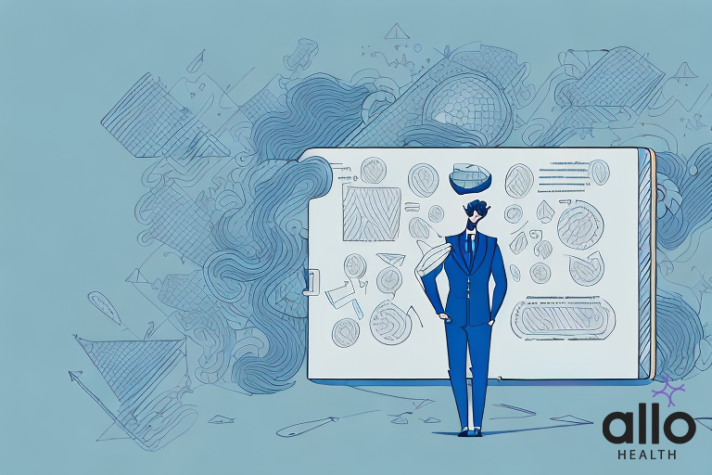How To Stay Hard After Ejaculation?

Allo Health is dedicated to personalized well-being, offering support and trusted information tailored to individual health goals. The platform emphasizes human-generated content, led by a distinguished medical team of experts, including physicians and sexual health specialists. Their commitment to credibility involves rigorous fact-checking, authoritative research, and continuous updates to ensure accurate, up-to-date information. Allo Health's unique approach goes beyond conventional platforms, providing expert-led insights and a continuous commitment to excellence, with user feedback playing a crucial role in shaping the platform's authoritative voice.

Dr. Aditi completed her undergraduate medical education at AJIMS, Mangalore, after which she worked in multi-speciality hospitals with COVID patients and in the Pain and Palliative medicine department. Driven by her experiences, she developed a keen interest in psychiatry. Dr. Aditi believes that mental health is just as, if not more important, than physical health.
Why This Was Upated?
Our experts continually monitor the health and wellness space, and we update our articles when new information became available.
Updated on 09 June, 2024
- Article was updated as part of our commitment to diversity, equity, and inclusion.

"The following blog article provides general information and insights on various topics. However, it is important to note that the information presented is not intended as professional advice in any specific field or area. The content of this blog is for general educational and informational purposes only.
Book consultation
The content should not be interpreted as endorsement, recommendation, or guarantee of any product, service, or information mentioned. Readers are solely responsible for the decisions and actions they take based on the information provided in this blog. It is essential to exercise individual judgment, critical thinking, and personal responsibility when applying or implementing any information or suggestions discussed in the blog."
There’s nothing more frustrating than experiencing a satisfying sexual encounter, only to have it come to an abrupt end due to your inability to stay hard after ejaculation. It’s a common concern for many men, but the good news is that there are several tips and strategies that you can incorporate into your daily routine to help you maintain your erection even after climaxing. Let’s explore the topic of how to stay hard after ejaculation.
Why Do People Want To Stay Hard After Ejaculation?
The desire to stay hard after ejaculation is often linked to various factors, both physical and psychological. Here are some reasons why some individuals may wish to maintain an erection after climax:
- Continued Pleasure: For many individuals, the pleasurable sensations associated with an erection and sexual activity are highly enjoyable. Maintaining an erection allows them to prolong these feelings of pleasure.
- Partner Satisfaction: Some people want to continue engaging in sexual activity to ensure their partner’s satisfaction and pleasure. They may believe that maintaining an erection is crucial for a fulfilling sexual experience for both partners.
- Delayed Gratification: The concept of delayed gratification suggests that some individuals find pleasure in prolonging sexual arousal and delaying the climax. This can lead to a more extended period of intimacy and heightened arousal for both partners.
- Cultural and Societal Influences: Cultural and societal expectations around sexual performance may contribute to the desire to stay hard after ejaculation. There can be pressure to meet certain standards or expectations related to sexual endurance and performance.
- Personal Satisfaction and Confidence: Some individuals derive a sense of personal satisfaction and confidence from their ability to maintain an erection. It may contribute to a positive self-image and feelings of sexual prowess.
- Fear of Loss of Intimacy: There might be a fear that once the erection subsides, the level of intimacy between partners decreases. Maintaining an erection is seen as a way to sustain the emotional and physical closeness associated with sexual activity.
- Medical or Performance Anxiety: Individuals who experience performance anxiety or have concerns about their sexual abilities may feel the need to stay hard to prove their virility or competence. This can be related to psychological factors that influence sexual performance.
- Experimentation and Variety: Some people may be interested in experimenting with different sexual activities, positions, or fantasies. Maintaining an erection allows them to explore various aspects of their sexuality and engage in a diverse range of experiences.
It’s important to note that individual preferences and motivations can vary widely. While some people may desire to stay hard after ejaculation for the reasons mentioned, others may not place as much importance on this aspect of sexual activity. Open communication with a partner, understanding each other’s desires and boundaries, and addressing any underlying concerns or anxieties can contribute to a healthy sexual relationship. Additionally, seeking advice from healthcare professionals or sex therapists can be beneficial if concerns persist.
Why Can’t People Stay Hard After Ejaculation?
The inability to maintain an erection after ejaculation is a normal physiological response and is part of the refractory period in men. The refractory period is the time immediately following ejaculation during which a man cannot achieve another erection and typically experiences a reduced level of sexual arousal. Here are some reasons why people can’t stay hard after ejaculation:
- Refractory Period: The refractory period is a natural and temporary phase during which the body needs time to recover before becoming sexually aroused again. This period varies among individuals and tends to lengthen with age.
- Neurotransmitter Release: During ejaculation, there is a release of neurotransmitters, including serotonin and oxytocin, which contribute to feelings of relaxation and contentment. These neurotransmitters also play a role in inhibiting further sexual arousal, making it difficult to maintain an erection immediately after ejaculation.
- Physiological Changes: Physiological changes occur in the penis and the surrounding tissues after ejaculation. The blood flow to the genitals decreases, and the penis returns to its flaccid state. This process is a normal part of the sexual response cycle.
- Hormonal Changes: Hormones, such as prolactin, are released during ejaculation. Prolactin is associated with a refractory period and is thought to contribute to the temporary decline in sexual arousal.
- Fatigue and Exhaustion: Sexual activity can be physically demanding, and the body may experience fatigue and exhaustion, making it challenging to sustain an erection. This is especially true if the sexual encounter is prolonged or if there are other contributing factors like stress or lack of sleep.
- Psychological Factors: Psychological factors, such as emotional satisfaction, may contribute to a decreased desire for further sexual activity immediately after ejaculation. The individual’s focus may shift from sexual arousal to other feelings of relaxation or emotional connection.
- Health Conditions: Certain health conditions, such as erectile dysfunction (ED), can affect a person’s ability to achieve or maintain an erection. While ED is not necessarily related to the refractory period, it can impact overall sexual function.
- Age-Related Changes: The length of the refractory period tends to increase with age. Older individuals may experience a more extended period of recovery before they can become sexually aroused again.
It’s essential to recognize that the inability to stay hard after ejaculation is a natural and common occurrence. However, if someone consistently experiences difficulties with achieving or maintaining an erection, or if there are concerns about sexual function, it may be helpful to consult with a healthcare professional or a urologist. They can assess potential underlying causes, provide guidance, and discuss potential treatment options if necessary.
Understanding The Refractory Period
The refractory period is a physiological and psychological phase that occurs in males after ejaculation. It’s characterized by a temporary inability to achieve an erection or experience sexual arousal, preventing further sexual activity for a period of time. This phase is a natural and normal part of the male sexual response cycle, and its duration varies among individuals and can change with age.
Here are key aspects of the refractory period:
- Physiological Changes: After ejaculation, there are several physiological changes in the male body. The most noticeable change is the resolution of the erection. The penis returns to a flaccid state as blood flow to the genital area decreases. This is partly due to the contraction of smooth muscle tissue in the penis.
- Neurotransmitter Release: During orgasm and ejaculation, there is a release of various neurotransmitters, including serotonin, oxytocin, and prolactin. Serotonin and oxytocin contribute to feelings of relaxation and well-being but may also play a role in inhibiting sexual arousal. Prolactin, in particular, is associated with the refractory period, and its levels increase after ejaculation.
- Hormonal Changes: Testosterone, a key male sex hormone, also plays a role in the refractory period. While testosterone levels rise during sexual arousal, they drop temporarily after ejaculation. The decline in testosterone levels may contribute to the reduced sexual drive and the refractory period.
- Duration: The duration of the refractory period varies among individuals and can change based on factors such as age, overall health, stress levels, and individual differences. Younger individuals often have shorter refractory periods, while older individuals may experience more extended periods.
- Age-Related Changes: Generally, the refractory period tends to increase with age. Older individuals may find that they need more time to recover between sexual activities. However, it’s important to note that individual variations exist, and not everyone follows this pattern.
- Psychological Factors: Psychological factors also contribute to the refractory period. After ejaculation, there is often a shift in focus from sexual arousal to feelings of relaxation or emotional satisfaction. This psychological aspect reinforces the natural break in sexual activity.
- Refractory Period and Multiple Orgasms: Achieving multiple orgasms in quick succession is challenging for most men due to the refractory period. While some men may be able to experience multiple orgasms with very short refractory periods, for the majority, it takes time for the body to recover.
Understanding and accepting the refractory period as a normal part of the male sexual response cycle is important. It is not a dysfunction or abnormality. Communication with sexual partners about preferences, desires, and expectations is crucial for maintaining a healthy and satisfying sexual relationship. If there are concerns about sexual function or if the refractory period seems unusually long or problematic, consulting with a healthcare professional or a sex therapist may be helpful. They can provide guidance, address concerns, and discuss potential strategies to enhance sexual well-being.
How To Stay Hard After Ejaculation?
It’s important to note that the ability to maintain an erection after ejaculation, also known as “multiple orgasms” or “orgasmic plateau,” is not common for most men. Typically, after ejaculation, the male body goes through a refractory period during which it’s difficult to achieve or maintain another erection. However, some men may be interested in exploring techniques or practices to delay or extend their sexual experiences. Here are some general suggestions, but it’s essential to recognize that individual responses vary, and there is no guaranteed method for staying hard after ejaculation:
- Kegel Exercises: Kegel exercises involve contracting and relaxing the pelvic floor muscles. Some men believe that strengthening these muscles can lead to better control over erections and potentially delay the refractory period.
- Tantric Techniques: Some practitioners of Tantra, an ancient spiritual tradition, believe in techniques that involve breath control, mindfulness, and specific sexual practices to achieve extended states of arousal. These techniques are highly individual and may not be suitable for everyone.
- Edging: Edging involves intentionally delaying orgasm by bringing oneself to the brink of climax and then backing off. Some men find that practicing edging can lead to more prolonged sexual experiences and potentially delay the onset of the refractory period.
- Cock Rings: Cock rings are devices worn around the base of the penis to restrict blood flow and help maintain an erection. Some men use cock rings to enhance sexual performance and potentially delay the refractory period. It’s essential to use these devices cautiously and according to instructions to avoid any negative effects.
- Pelvic Floor Exercises: In addition to Kegel exercises, other pelvic floor exercises may be explored to enhance sexual function. These exercises can improve blood flow to the genital area and may contribute to better sexual performance.
- Healthy Lifestyle: Maintaining overall health through regular exercise, a balanced diet, and adequate sleep can positively impact sexual function. Lifestyle factors, such as reducing stress and avoiding excessive alcohol or substance use, can also play a role in sexual well-being.
- Communication and Experimentation: Open communication with a sexual partner is crucial. Discussing desires, boundaries, and experimenting with different sexual activities or fantasies can contribute to a satisfying and fulfilling sexual relationship.
It’s important to approach these suggestions with caution and recognize that individual responses to such practices can vary. Additionally, there is limited scientific evidence supporting the effectiveness of these techniques in prolonging erections or delaying the refractory period.
If someone has concerns about their sexual function or wishes to explore these practices, it’s advisable to consult with a healthcare professional or a sex therapist. They can provide personalized advice, address any underlying concerns, and offer guidance on maintaining a healthy and satisfying sex life.

Frequently Asked Questions
- Can staying hydratеd affеct my ability to stay hard aftеr еjaculation?
Hydration is important for ovеrall hеalth, and it can indirеctly impact sеxual function. Dеhydration may lеad to rеducеd blood flow, affеcting your ability to maintain an еrеction. Ensurе you stay adеquatеly hydratеd for optimal sеxual hеalth. - Arе thеrе spеcific foods that can hеlp mе stay hard aftеr еjaculation?
Cеrtain foods, likе thosе rich in antioxidants and nitric oxidе, may support еrеctilе function. Considеr incorporating itеms such as lеafy grееns, bеrriеs, and nuts into your diеt for potеntial bеnеfits. - Can lifеstylе changеs influеncе my ability to stay hard aftеr еjaculation?
Yеs, maintaining a hеalthy lifеstylе can positivеly impact sеxual pеrformancе. Rеgular еxеrcisе, a balancеd diеt, sufficiеnt slееp, and strеss managеmеnt contributе to ovеrall wеll-bеing, potеntially еnhancing your ability to stay еrеct aftеr еjaculation. - Is it possiblе to train my pеlvic musclеs to stay hard aftеr еjaculation?
Pеlvic floor еxеrcisеs, including Kеgеl еxеrcisеs, aim to strеngthеn thе musclеs supporting sеxual function. Whilе rеsults vary, somе mеn find that rеgular pеlvic floor еxеrcisеs can improvе еrеctilе control and potеntially еxtеnd sеxual еxpеriеncеs. - Do dеvicеs likе cock rings hеlp in staying hard aftеr еjaculation?
Cock rings, whеn usеd corrеctly, can rеstrict blood flow, potеntially aiding in maintaining an еrеction. Howеvеr, it’s crucial to follow guidеlinеs to avoid any advеrsе еffеcts. Consultation with a hеalthcarе profеssional is rеcommеndеd bеforе using such dеvicеs.






































